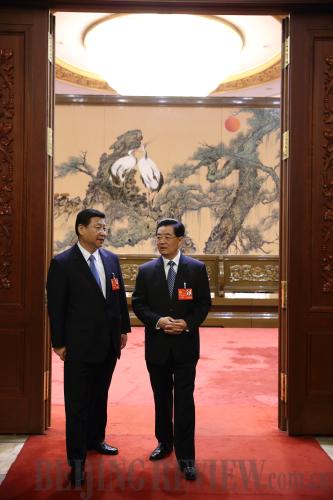|
 |
|
SMOOTH TRANSITION: Chinese leaders Hu Jintao and Xi Jinping chat following the first meeting of the presidium of the 18th CPC National Congress in Beijing on November 7 |
Convened at a time when the world's economic future is tied to China's growth, the 18th CPC National Congress was not only a landmark event for China but also had global implications. Most importantly, the congress showed the CPC's commitment to delivering prosperity and equity to all Chinese people. As it pushes for more balanced development with new leaders in place, China will continue to serve as a global economic powerhouse as well as a staunch guardian for international justice.
Mindful of the opportunities and challenges lying ahead, the new leaders will put the policies agreed upon at the 18th CPC National Congress into practice, observers said.
"The congress is significant," said Philip Ogunmade, a journalist with THISDAY, the largest newspaper in Nigeria. "China is growing so much. Its development is a miracle. And it took up the opening-up [policy]. Like before, the opening up will continue under the new leadership."
Wan Yu, a delegate from northeast China's Jilin Province, said she was excited and heartened after hearing the report delivered by Hu Jintao. Wan, principal of a school for orphans in the provincial capital Changchun, told Beijing Review she was glad that the report gave priority to improving people's livelihoods and enabling them to benefit substantially from China's development. In her view, these messages are a blessing to orphans, a vulnerable and often marginalized group.
"Grand goals such as a moderately prosperous society and social harmony come down to raising people's living standards," said Xie Chuntao, a professor with the Party School of the CPC Central Committee. Hu Jintao's report to the 18th CPC National Congress called for further improvements in crucial social services such as education, social security and healthcare.
With the bar having been raised, pressures on the new leadership are daunting, said Kerry Brown, Executive Director of the China Studies Center of the University of Sydney. "There are great challenges of social cohesion, inequality and balance in the hardware and software of society," Brown said. "For the new leadership, these challenges will only grow in complexity as China becomes a middle-income country."
The report also set the goal of doubling China's 2010 GDP and the per-capita income of urban and rural residents by 2020. It was the first time for the CPC to include per-capita income in China's 2020 blueprint for a moderately prosperous society. Previous targets merely called for GDP growth.
The per-capita disposable income of urban residents in China rose 8.4 percent to 21,810 yuan ($3,498) in 2011 from a year earlier after deducting inflation, according to the National Bureau of Statistics. Meanwhile, the per-capita net income of rural residents grew 11.4 percent year on year to 6,977 yuan ($1,119).
Despite the global economic slowdown, the CPC has promised to make this goal a reality—a pledge that highlights its devotion to the well-being of Chinese people, Xie said.
Fewer than 2 billion people worldwide currently enjoy the standard of living as envisioned in a moderately prosperous society, said Hu Angang, a renowned economist with Tsinghua University and a delegate to the 18th CPC National Congress. When the goal is realized, 1.3 billion Chinese will join this group of affluent people, marking an unprecedented improvement in the well-being of mankind, he said.
"My core argument is that China's success is a success for the world and China's failure is a failure for the world," he said, adding that China will not fail.
In a report published in early November, the Paris-based Organization for Economic Cooperation and Development said China will overtake the United States by 2016 to become the world's largest economy.
The International Monetary Fund also predicted in April that China's economy will be bigger than that of the United States by 2016 in terms of purchasing power parity.
| 